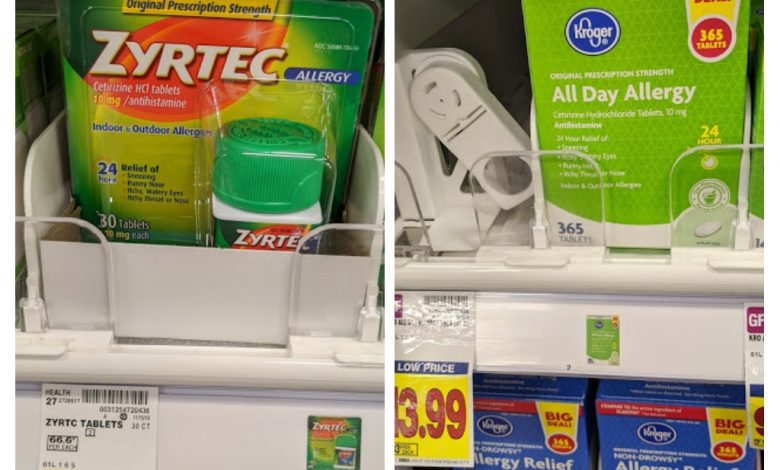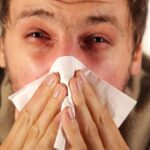Can I Take An Expired Allergy Medicine?

The expiration date is the final day that the manufacturer guarantees the full potency and safety of a medication. Drug expiration dates exist on most medication labels, including prescription, over-the-counter (OTC), and dietary (herbal) supplements.
According to the FDA, drug expiration dates reflect the time period during which the product is known to remain stable, which means it retains its strength, quality, and purity when it is stored according to its labeled storage condition. In the late 1970s, the United States Food and Drug Administration (FDA) mandated that all prescription and over-the-counter (OTC) medical products contain an expiration date. Expiration dates for medicines are often marked “EXP” and are printed on the label or stamped onto the medicine bottle or box.
However, with a study conducted by the U.S. military showing that some medications could retain their potency up to one year after the expiration date has passed, this article will be taking a look at whether you can take an allergy medication that has expired.
What is Allergy?
An allergy is an immune system response to a foreign substance that’s not typically harmful to your body. These foreign substances are called allergens. They can include certain foods, pollen, or pet dander.
Your immune system’s job is to keep you healthy by fighting harmful pathogens. It does this by attacking anything it thinks could put your body in danger. Depending on the allergen, this response may involve inflammation, sneezing, or a host of other symptoms. And whether you experience them seasonally or year-round, they can make you feel pretty miserable. The good news is that there are many different types of allergy medicine to help keep your symptoms in check and data indicate over 75% of American allergy sufferers take medication to relieve their symptoms.
Types of Allergy Medicines
Antihistamines
If your allergies only appear sporadically — say when the pollen count is high or you have that random encounter with your friend’s cat — oral antihistamines may be your best bet.
These include over-the-counter (OTC) allergy medicines like:
- Allegra (fexofenadine)
- Benadryl (diphenhydramine)
- Claritin (loratadine)
- Xyzal (levocetirizine)
- Zyrtec (cetirizine)
Histamine is a chemical our immune system releases when we come into contact with something we’re allergic to. It then triggers allergy symptoms, like a runny nose or itchy eyes. Antihistamines work by blocking areas of your body where histamine would normally attach to cause these symptoms.
While some people take antihistamines as needed for allergy symptoms, daily use is currently expert recommended and may be an option to consider for people struggling with symptom control.
In the case of seasonal allergies, antihistamines can also be used ahead of time before you’re exposed to an allergy trigger — like pollen. Starting the medication at least 2 weeks before allergy season begins can help you get the best results. This can be particularly helpful if you suffer from frequent seasonal allergy symptoms.
Nasal steroids
If you experience daily or year-round allergies, you’ll want to look into nasal steroids as an allergy medicine. They can also be helpful if you know your seasonal allergies symptoms tend to last for several weeks.
OTC nasal steroid options include:
- Flonase (fluticasone propionate)
- Nasacort (triamcinolone)
- Nasonex (mometasone) is another allergy medicine option you can consider, but it requires a prescription.
- Rhinocort (budesonide)
These medications can take longer to work than antihistamines, but healthcare providers consider them to be the most effective maintenance therapy for nasal allergies. As a group, they may also be more effective at controlling nasal congestion compared to antihistamines.
Here’s how they’re thought to work: When you have allergies, a complicated series of reactions occur in your immune system between the moment you sense an allergen and when you get that runny nose. Nasal steroids act early on in these reactions — even before histamine is made — and prevent those processes that lead to a full-blown allergic response. However, the specific way nasal steroids work hasn’t been proven.
Decongestants
Decongestants — which include oral medications like Sudafed (pseudoephedrine) and OTC nasal sprays like Afrin (oxymetazoline) — help improve symptoms by relieving nasal and sinus congestion. They usually work within about 30 minutes. Depending on your state, Sudafed may require a prescription. But if you don’t need one, you’ll be able to find it behind the pharmacy counter.
Some allergy medicines like Allegra-D (fexofenadine/pseudoephedrine) and Claritin-D (loratadine/pseudoephedrine) combine both decongestants and antihistamines into the same pill, so they can target congestion and other allergy symptoms at the same time.
Decongestants can help you breathe a little easier if you’re stuffed up, but they shouldn’t be taken long-term. And it’s important to know that certain nasal decongestant sprays, like Afrin, can make your congestion worse if they’re used for more than a few days (called rebound congestion). So it’s best to use them sparingly.
Oral decongestants, like Sudafed, also shouldn’t be used if you have certain heart conditions, including high blood pressure. So if you have underlying health conditions, talk to a pharmacist or healthcare provider first before giving them a try.
Can I take expired allergy medicine?
No, do not take or consume an expired allergy medicine. An expiration date is a date after which a consumable product such as food or medicine should not be used because it may be spoiled, damaged, or ineffective. Expiration dates are especially important for medications because they offer the only indication about whether the product is still safe to use.
Taking an expired allergy medicine can hurt you because it is less effective and risky due to a change in chemical composition or a decrease in strength. A sub-potent or expired allergy medicine can also fail to relieve allergy symptoms such as sneezing, itching, a stuffy or runny nose, and watery eyes.
Once the expiration date has passed (usually two to three years after the date of manufacture), there is no guarantee that the allergy medicine will be safe and effective. If your allergy medicine has expired, do not use it. Even though some controversial studies indicate that some medications can be used after expiry dates, it is better to err on the side of caution in order not to complicate your health condition, or exacerbate and trigger unwanted adverse effects.
Some of the major side effects of commonly used allergy medications include:
- Blurred vision
- Confusion
- Dizziness
- Drowsiness
- Dry mouth
- Nausea and vomiting
- Restlessness or moodiness (in some children)
- Trouble peeing or not being able to pee
This is not a complete list of side effects and others may occur. Call your doctor for medical advice about side effects. You may report side effects to FDA at 1-800-FDA-1088.
Frequently Asked Questions
Q: What are the common types of allergy medicine?
A: The common types of allergy medicine include antihistamines, decongestants, corticosteroids, and immunotherapy.
Q: What happens when allergy medicine expires?
A: When allergy medicine expires, the effectiveness and safety of the medication may decrease. The medication may not work as well, or it may cause more side effects.
Q: Can I take expired allergy medicine?
A: It is not recommended to take expired allergy medicine. The medication may not work as well, or it may cause more side effects. It is best to dispose of expired medication and obtain a new prescription from a healthcare provider.
Q: How do I dispose of expired allergy medicine?
A: It is recommended to dispose of expired allergy medicine properly by taking it to a drug take-back program or by following the instructions on the medication label. Do not flush the medication down the toilet or throw it in the trash.
Q: How long does allergy medicine last before it expires?
A: The expiration date of allergy medicine can vary depending on the manufacturer and the formulation. It is important to check the medication label for the expiration date and to store the medication properly to ensure its effectiveness and safety.
Q: Can expired allergy medicine be harmful?
A: Expired allergy medicine may not be as effective and safe as unexpired medication. It is possible that the expired medication may cause more side effects or not work as well. It is recommended to dispose of expired medication properly and obtain a new prescription from a healthcare provider.
Q: What are the side effects of taking expired allergy medicine?
A: The side effects of taking expired allergy medicine may be similar to those of taking unexpired medication, but they may be more severe or prolonged. Common side effects of allergy medicine include drowsiness, dry mouth, dizziness, and headache.
Q: How do I store allergy medicine properly?
A: Allergy medicine should be stored in a cool, dry place away from heat and moisture. It should be kept out of reach of children and pets. It is important to follow the storage instructions on the medication label to ensure its effectiveness and safety.
Q: Can I share my allergy medicine prescription with someone else?
A: No, it is not legal or safe to share your allergy medicine prescription with someone else. It is important to only take medication prescribed to you by a healthcare provider.
Q: What should I do if I accidentally take expired allergy medicine?
A: If you accidentally take expired allergy medicine, monitor yourself for any side effects or adverse reactions. If you experience any severe symptoms or have concerns, contact a healthcare provider immediately.
Q: Can I take expired allergy medicine in an emergency situation?
A: It is not recommended to take expired allergy medicine in an emergency situation. The medication may not work as well, or it may cause more side effects. It is best to obtain a new prescription from a healthcare provider or seek emergency medical attention if needed.
Q: Is it safe to buy allergy medicine online?
A: It is not recommended to buy allergy medicine or any prescription medication online without a valid prescription from a healthcare provider. There are many risks associated with buying medication online, including receiving counterfeit or expired medication.
Q: Can I drink alcohol while taking allergy medicine?
A: It depends on the type of allergy medicine you are taking. Some allergy medicines can interact with alcohol and increase the risk of side effects or adverse reactions. It is important to follow the instructions of your healthcare provider regarding the use of allergy medicine and alcohol.
Q: How long does allergy medicine stay in your system?
A: The length of time allergy medicine stays in your system can vary depending on various factors, including the type of medication, your age, weight, metabolism, and dose. In general, allergy medicine can





